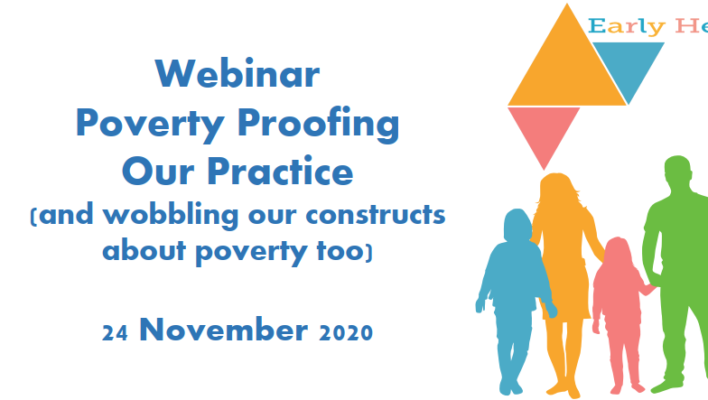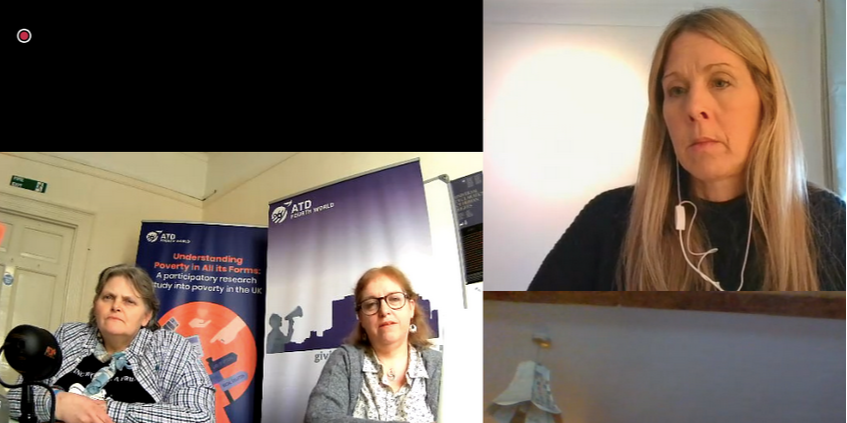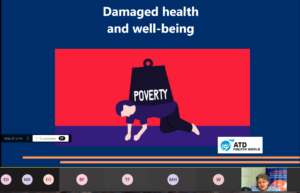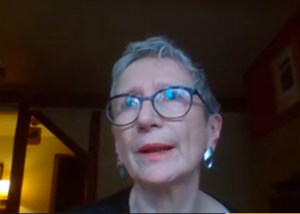Poverty Proofing Daily Practice

On 24 November 2020, Amanda Button and Diana Skelton represented ATD Fourth World at a webinar called “Poverty Proofing Our Camden Practice” organised by Becca Dove, the head of Family Support and Complex Families for the London Borough of Camden. Professor Brid Featherstone introduced the subject of poverty, inequality and neglect and outlined the findings and implications of the Child Welfare Inequalities Project. Diana and Amanda’s remarks are below.
Amanda, Diana and Becca.
Remarks by Diana Skelton
Proactively addressing poverty and supporting families through anti-oppressive practice
I’m going to start with a frustrating example. After a 16-year-old boy failed his exams, he stopped school and was left for a full year outside of training or employment. When the boy was 17, Andrew, one of ATD Fourth World’s family support workers, took him to approach the careers guidance office at the local council. Their first reaction was to say: “You’re in breach of the law” because up to the age of 18 everyone is required to be in education, training or employment.
The council knew who this boy was and had made feeble attempts to contact him. They said, “We tried the phone number twice but couldn’t get through”. The council also knew that this boy’s family was in poverty (because until he was 15, the family was under the auspices of social services). But it never once occurred to them that families in poverty frequently have phone numbers stop working. Maybe their phone gets cut off, or they lose a phone and can’t afford to replace it, or they change contracts because they heard another one would be cheaper.
Our first message about proactive practice would be to always consider a variety of ways to communicate, for example by sending a letter or making a visit to help a young person approach a careers guidance office.
In addition, the council jumped from a disconnected phone number to telling this boy that he was in breach of the law. This made his first meeting a confrontational one. It also disregarded the council’s duty of care towards him.
Empathy rather than confrontation
Proactive practice is also about choosing the most empathetic words while building a relationship. A father in poverty showed the difference that empathy makes while explaining why he appreciated Andrew having accompanied him to meetings with social services:
“If we’re uptight, having you come helps. It means I don’t lose my temper and walk out. They know how to push your buttons, and how far to push you before you explode. But when ATD comes, you have a neutral person who sees it from social services’ point of view and from our point of view. You get someone who can tell you to dial it down a bit and listen to the crap they’ve got to say. And now I actually see it in a new light. I can see how some social workers want to work with the parents but their hands are tied.”
Another example concerns two sisters whose school attendance was bad. The school professionals interpreted this as neglect and bad parenting. But in fact the trouble was that the girls had lost the zip cards for their bus fare. Applying for new zip cards required expensive identity photos, as well as email address and access to a computer, all of which the family lacked. Andrew says:
“Once you unpack the reasons they didn’t have zip cards, structural poverty runs all the way through it. During the case conference, once this was pointed out, all the professionals went silent and sheepish, looking at the floor. The chair was gobsmacked. She said it had never crossed her mind that the family just couldn’t afford to replace the zip cards.”
Following the case conference, Andrew helped the mother to replace the zip cards. And in the months that followed, the school social worker became more attentive to the family’s needs and willing to learn.
When one of the girls lost her zip card a second time, the social worker contacted Andrew to ask: “How can I help the family get a new card?” This was proactive practice where a practitioner was willing to listen to and learn from a family’s lived experience.
Respecting inner strength
One of our key values is to respect families’ inner strength and what they already know and do. For example, a father explains:
“When you’ve been out of work a long time, you need to do physical things to bring the skills you learned in the past back to life. In ATD’s skills-sharing project, they took my skills on board and let me do things. That helped me get the confidence to get off my backside and get a job”.
In another situation, a guardian wrote in a report that a mother “sometimes had ripped clothes and always seemed to have a damp odour”. A social worker said that this mother “obviously mismanaged her money”. However, one of ATD’s family support workers, Shaeda, was able to show the professionals that in fact the mother was making do as best she could with a very tight budget.
She had got into rent arrears when she started a part-time job and was given bad advice by the job centre that led to a reduction in her housing benefit. As this woman’s son was with foster parents, she didn’t receive child benefit or tax credits. Three times a week during contact visits, she was allowed to bring lunch to feed her son. To give him continuity, she always bought the same expensive organic food as the foster parents. This mother put her son’s needs first by going without for herself.
Her torn clothes were caused by a broken piece of plastic inside her washing machine. Without a tumble dryer, she struggled to dry her laundry inside her flat. In cold weather when she often had to choose between using her gas and electricity for either heating or eating which meant her flat was damp. When the numerous reports about her appearance had gotten to her, she had bought new clothes for court instead of paying rent arrears for two months. This meant having to sort out a new arrangement with the housing association in order to avoid eviction.
Shaeda explained all this to the social worker, shining a spotlight on the mother’s efforts and unseen positives.
Well-being and respite
Because poverty impacts well-being, several of our projects focus on well-being and respite. This can be as simple as inviting someone to meet up for coffee with no agenda but switching off from pressure to have a bit of normality, however brief. ATD Fourth World also runs a countryside residential centre where we can host families or individuals, offering a chance to relax away from the stresses and strains of life in a non-judgemental environment.
Peer support is also a strong thread running through all our projects. By developing a sense of community with others facing similar struggles, parents who feel broken slowly start to feel human again and to find themselves.
“Giving Poverty a Voice” is our public-facing work, designed together with people in poverty. Even when in the throes of a life crisis, some people appreciate taking part in a meeting to think about the big picture. In Andrew’s experience:
“Even in the middle of a crisis, a change is as good as a rest. It definitely helps to focus on something different and to have that tiny break to think about something else for a day”.
Driving change by valuing people
Finally, we believe that building a valued working relationship based on empathy and respect of human dignity can help drive change. In an interview in 2016 , Moraene Roberts, who passed away in January, explained this:
“Most services come with loads of conditions, but ATD was without conditions. They said, ‘We see you’re in need, tell us how we can help’. I just wanted a whole day on my own. For so long, I had not had a whole day without my children or without people knocking on my door or giving me grief. And they did it. They took the kids out for a day. I was gobsmacked.
“I could feel a change in me. I was being accepted rather than changed to fit what someone else thought I should be. I was changing because I was being helped to realise that I needed to. It was my choice to change; not theirs. You cannot change your life in the long-term with short-term solutions being imposed on you. It doesn’t work that way. […] Poverty destroys something deep inside that needs to be rebuilt slowly.
“ATD understands that it has taken many years for people to get to where they’re at. Your long-term habits will creep back and back. ATD knows that it takes time for genuine change that you can accept for yourself and is not imposed.
“I’ve had social workers and teachers say, ‘Oh, Mo, you were doing so well…’, but I’ve never had ATD say it. They say, ‘I’m glad you told me, let’s see where we’re at.’ That’s acceptance; not that you’re a failure but acceptance that people do take backward steps and may need support again to move forward again.
“With social work, there’s a feeling that you’ve already messed things up and the only potential you have is to mess things up even more. So the emphasis is not on you giving the best of yourself but on preventing you giving the worst. ATD believes that families have huge potential. They’ve not had the chances or the opportunities but people believe in you and trust you.”
Remarks by Amanda Button
In October 2019, ATD Fourth World published a report about a participatory research project that looks at how we can develop an Understanding Poverty in All Its Forms. I have been a part of this project from the beginning and involved with ATD for much longer. More than ten years ago, I met ATD Fourth World. It’s where we can come out the other side of poverty. We come together with others in a way that makes each person feel honoured in their soul. It’s our saving grace, knowing that even if we screw up along the way, we can always come back and start again. Each of us has a backbone to stand up for what’s right—and together, we’ve got strength in numbers.
Three years ago, when I got asked to become a co-researcher for this study, I said yes because I believe that people with lived experience of poverty need to be around the table. More than that, we need to be in the forefront every step of the way. But when I said yes, I had no idea what I was letting myself in for! Research can just quite simply fry your brain! But I also quite enjoyed the whole experience and getting to meet with people from other countries to see the commonalities and be able to merge our findings with theirs.
During our research, we uncovered six dimensions of poverty:
1. DISEMPOWERING SYSTEMS, STRUCTURES AND POLICIES
Economic, political and social structures can cause poverty. Policy is operated in such a way that disempowers. Systems designed to support people are not working in the ways that people want or need them to. For example, systemic cuts in funds for much needed services make inequality worse.
The same system that creates wealth also creates poverty. It could be sorted, but we choose not to.
People spoke to us about a broken system that doesn’t need people’s needs. Sometimes it even feels unnecessarily harsh, like it’s designed to wear you down by bullying. A good example of this are job centre sanctions, or hostile interventions by social services. You’re treated like cattle—you have no dignity and no identity.
People felt that policy makers were very remote and that they didn’t understand people’s lives well. At the same time, some people saw that the system also puts constraints on social workers who may want to keep families together but get overruled by managers.
But the result is that poverty feels like a tangled web that you can never escape.
2. FINANCIAL INSECURITY, FINANCIAL EXCLUSION AND DEBT
Financial insecurity means not being able to satisfy your basic needs. Worrying about money every day causes huge stress and misery.
The cost of living is going up; but benefits are going down or are capped. Even with good budgeting skills, people told us how they couldn’t make ends meet and that they could be floored by an unexpected bill that needs paying with money you just don’t have. This often leads to debt, having to borrow from friends and neighbours. Many people said they had to rob Peter to pay Paul. If you’re starving, it’s difficult to think of anything else.
3. DAMAGED HEALTH AND WELL-BEING
Poverty is bad for health and can shorten your life. It has a negative impact on physical, emotional, mental and social well-being.
Poverty can cause problems with your health and well-being in many ways. Stress can lead to depression. You can feel lost in the fog, not knowing if you’re cast adrift. Poverty kills dreams and cages the dreamers.
Not being able to afford healthy meals or have the means to cook fresh food can lead to ill health and a lack of energy. This affects your life at home and at work. Children can struggle to concentrate at school. Some people talked about being forced into prostitution because of lack of food.
We were shocked by how often people described traumatic experiences and by the burdens they were carrying. Many people insisted that poverty cuts lives short. Poverty can destroy your soul.
4. STIGMA, BLAME AND JUDGEMENT
Misrepresentation about poverty in the UK and a lack of understanding lead to negative judgement, stigma and blame, which are deeply destructive to individuals and families. Prejudice and discrimination result in people in poverty feeling they are treated like lesser human beings. You feel judged for things that are not your fault by people who haven’t walked in your shoes.
It only takes one incident of someone abusing the system for some of the press to jump on it and tarnish everyone on benefits. People complained about being viewed as dossers, scroungers, or lazy. Your post code can be a source of discrimination, as can your appearance if you’re struggling to keep on top of life. What really affected us as co-researchers was to learn how much people blamed themselves and felt guilt about their situations. Too many people believe that poverty is their fault.
5. LACK OF CONTROL OVER CHOICES
Poverty means a lack of control over choices and opportunities. Over time, this can lead to increased social isolation and risk, as well as restricting people’s social, educational and cultural potential. The lack of good options reduces people’s control over their own lives and traps people in repetitive cycles of poverty, hardship, disappointment and powerlessness. Poverty is dehumanising.
People told us that because of poverty, they have missed out on so many things, such as a night out with work colleagues, or children unable to join their friends on school activities.
Sometimes people said they were only left with bad choices. People also spoke about endless days of boredom with nothing constructive or pleasant to do. It feels like a dungeon of boredom, staring at the same four walls and chained up in a place where nothing happens.
6. UNRECOGNISED STRUGGLES, SKILLS AND CONTRIBUTIONS
The wealth of experience and life skills that people in poverty possess is not recognised enough. All too often, public discourse undervalues the contribution that people in poverty make to society and to their communities while facing the daily impact of poverty.
We heard that people find all sorts of ways to make a difference in their communities through helping family, friends and neighbours, etc. For example, they might look after a neighbour’s children while the neighbour goes for a job interview. Volunteering with charities or through local religious groups is a way for people to feel constructive.
I’ve seen this during the pandemic too. Kids, as young as 10 or 11 or younger, will knock on the door of an old person a few doors away if they’re going to the shop to offer to bring them something. Or they’ll shout through the door, “Hello Mr. Such-and-Such” just to see if they get a response.
People also feel that they have good ideas about how to improve things; but their voices are very seldom heard.
*
When we asked people about the connections and relationships between these six dimensions, most people saw “disempowering systems” and “financial insecurity” as the main drivers of poverty. Their effects ripple out across the other dimensions and then ripple back in again as negative effects are reinforced.
We spent three years on this research, and now we’ve finished it—but our work is just beginning. Now we’ve got to knock on doors to get people to listen to us so that they understand more about poverty and so that we can figure out tangible solutions together.




